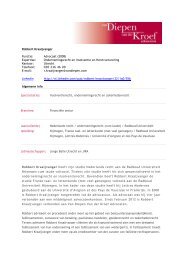© Van Diepen Van der Kroef Advocaten
© Van Diepen Van der Kroef Advocaten
© Van Diepen Van der Kroef Advocaten
- No tags were found...
Create successful ePaper yourself
Turn your PDF publications into a flip-book with our unique Google optimized e-Paper software.
The Article envisages a situation in which a State becomes a Member of the UN. That isabsolutely not the case in the present proceedings. The reference to the own law of theState in question entails also that if an obligation relevant to these proceedings were toarise un<strong>der</strong> Section 34 for the State of the Netherlands then that also means that theinternational treaties applicable un<strong>der</strong> the law of the Netherlands are also here applicablein these proceedings.One can think in particular of Article 6 of the European Convention for the Protection ofHuman Rights and Fundamental Freedoms of 4 November 1950 (ECHR), Article 10 of theUniversal Declaration of Human Rights of 10 December 1948 (UDHM) and Article 14 of theInternational Covenant on Civil and Political Rights of 16 December 1966 (IVBPR), as well asthe Convention on the Prevention and Punishment of Genocide (Genocide Convention). Therights that arise un<strong>der</strong> these provisions apply absolutely and universally and permanently.These rights are not subject to restrictions, in contrast to what by definition applies to theimmunity of the UN. In the originating writ of summons the Association et al. extensively setout that should the District Court deem itself to be without jurisdiction to hear the claim,the rights of the Association et al. that arise un<strong>der</strong> the provisions cited above would beviolated.45. The conclusion to be drawn from the above is that the State of the Netherlands is un<strong>der</strong> nointernational obligation to institute any motion in interim proceedings and thereforepossesses no interest.That is even more cogent as the UN are themselves co-defendant and can advance withouthindrance their own interests if any. Should any international obligation exist on the Stateof the Netherlands to invoke the immunity of the UN, such obligation is restricted bynational legislation, including the international treaties cited, which have direct effect.Interest already sufficiently safeguarded by Article 44 CCPr46. The following part of this ground of appeal is directed against legal consi<strong>der</strong>ation 5.5 inwhich the District Court mainfested an erroneous view of Article 44 CCPr in general and inthese proceedings in particular.47. The District Court held that it would not detract from the assumed interest un<strong>der</strong>international law of the State of the Netherlands that the Public Prosecutor’s Department<strong>©</strong> <strong>Van</strong> <strong>Diepen</strong> <strong>Van</strong> <strong>der</strong> <strong>Kroef</strong> <strong>Advocaten</strong> page 19 of 99
















